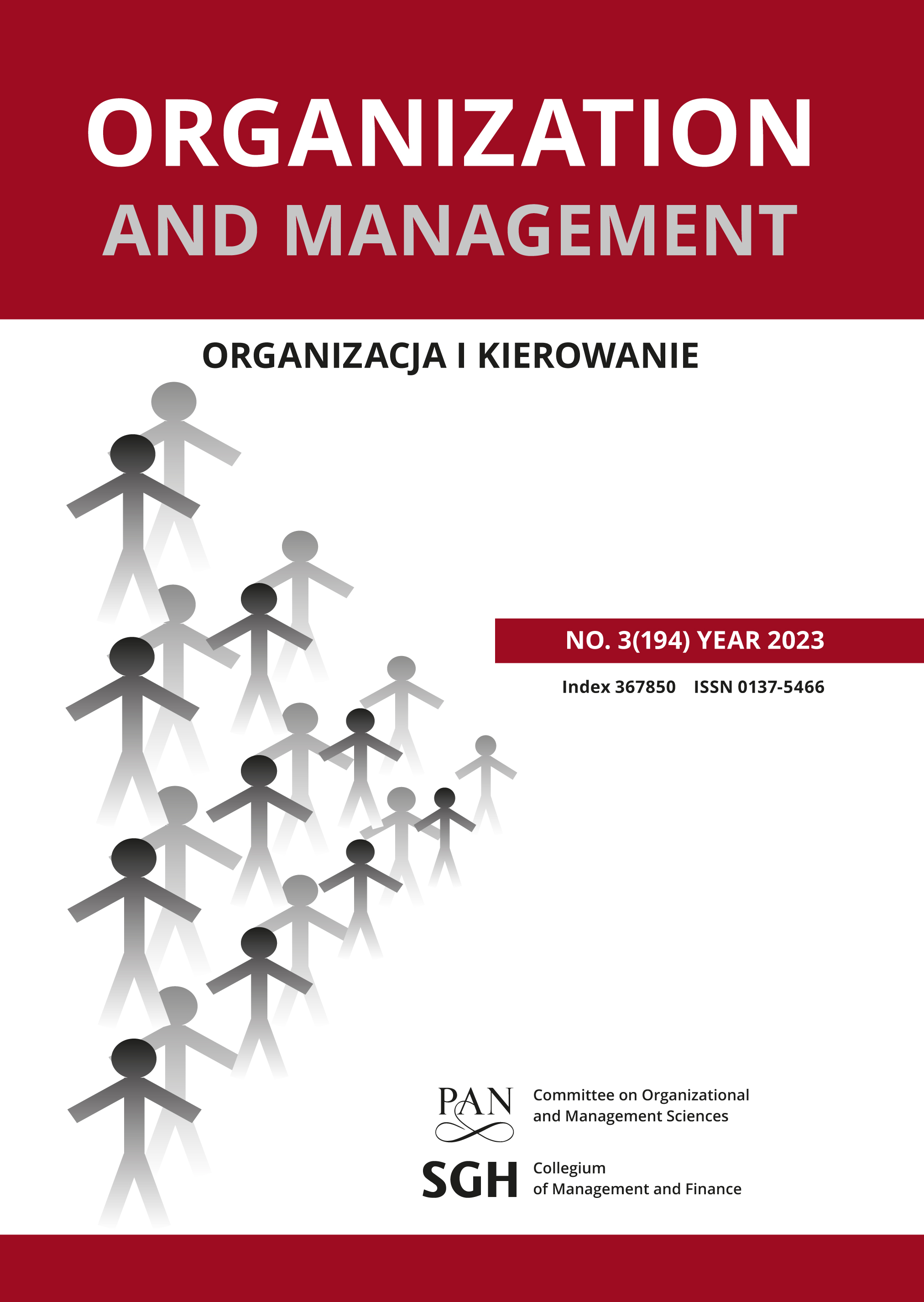WHAT STIMULATES SCIENTISTS TO RESEARCH RESULTS COMMERCIALIZATION? DISCOVERY AND DELIVERY SKILLS PERSPECTIVE
Main Article Content
Abstract
Based on a systematic literature review and the concept of ‘Innovator’s DNA’ by Dyers et al., this paper aims to broaden the knowledge about scientists’ discovery and delivery skills that stimulate them to commercialize research results. We use the data from a quantitative study conducted at one of the leading research universities in Poland. The survey was completed on a representative sample of 496 scientists. We used the EFA to test the factors underlying the Innovator’s DNA scale and the logistic regression to interpret the relationship between the identified scientist’s skills and the commercialization of their results. The EFA results showed that, in the case of scientists, unlike in the Innovator’s DNA concept, the analyzed skills focused on four factors. We defined them as disciplined, detail-oriented implementation, searching for new ideas, drawing inspiration, and questioning skills. The logistic regression estimation showed that only the drawing inspiration skills affected the commercialization activity of the surveyed scientists.
Article Details
References
Abdullah, I., Omar, R., Panatik, S. A. [2016], A literature review on personality, creativity and innovative behavior, International Review of Management and Marketing 6 (1): 177–182.
Aburai, T., Takeyasu, K. [2020], Effects of innovation education and corporate needs –analysis using Bayesian network, International Business Research, 13 (12): 51–62.
Andrade, E. P., dos Santos Pereira, J., Rocha, A. M., Nascimento, M. [2022], An exploratory analysis of Brazilian universities in the technological innovation process, Technological Forecasting and Social Change, 182: 121876.
Antonioli, D., Nicolli, F., Ramaciotti, L., Rizzo, U. [2016]. The effect of intrinsic and extrinsic motivations on academics’ entrepreneurial intention, Administrative Sciences, 6 (4): 15.
Anwar, M. [2017], Linkages between personality and knowledge sharing behavior in workplace: Mediating role of affective states, E a M: Ekonomie a Management, 20 (2): 102–115.
Armstrong, E. G., Barsion, S. J. [2013], Creating “Innovator’s DNA” in health care education, Academic Medicine, 88 (3): 343–348.
Autio, E., Hmeri, A. P, Nordberg, M. [1996], A framework of motivations for industry – big science collaboration: A case study, Journal of Engineering and Technology Management – JET-M, 13 (3–4): 301–314.
Baldini, N. [2011], University patenting: patterns of faculty motivations, Technology Analysis & Strategic Management, 23 (2): 103–121.
D’Este, P., Perkmann, M. [2011], Why do academics engage with industry? The entrepreneurial university and individual motivations, Journal of Technology Transfer, 36 (3): 316–339.
De Cleyn, S. Festel, G. [2016], Academic spin-offs and technology transfer in Europe – concluding insights and outlook, in: De Cleyn, S. Festel, G. (eds.), Academic spin-offs and technology transfer in Europe, Edward Elgar Publishing, Cheltenham.
Dyer, J, Gregersen, H, Christensen, C. M. [2011], The innovator’s DNA: Mastering the five skills of disruptiveinnovators, Harvard Business Review Press, Boston.
Etzkowitz, H. [2004], The evolution of the entrepreneurial university, International Journal of Technology and Globalisation, 1 (1): 64–77.
Fayolle, A., Redford, D. (eds.) [2014], Handbook on the entrepreneurial university, Edward Elgar Publishing, Cheltenham.
Filippetti, A., Savona, M. [2017], University – industry linkages and academic engagements: individual behaviours and firms’ barriers. Introduction to the special section, Journal of Technology Transfer, 42 (4): 719–729.
Hayter, C. S. [2011], In search of the profit-maximizing actor: Motivations and definitions of success from nascent academic entrepreneurs, Journal of Technology Transfer, 36 (3): 340–352.
Hess, J. L., Fila, N., Purzer, S., Strobel, J. [2015], Exploring the relationship between empathy and innovation amongst engineering students, ASEE Annual Conference and Exposition, Conference Proceedings, 122.
Klein, S. B., Pereira, F. C. M. [2021], Entrepreneurial university: Conceptions and theoretical models, Revista Pensamento Contemporâneo Em Administração, 14 (4): 20–35.
Klofsten, M. [2008], A case study of an entrepreneurship programme, in: Groen A., Van Der Sijde P., Oakey R., Cook G. (eds.), New technology-based firms in the New Millennium, 6: 55–67.
Kolb, C., Wagner, M. [2015], Crowding in or crowding out: The link between academic entrepreneurship and entrepreneurial traits, The Journal of Technology Transfer, 40: 387–408.
Kuhn, T., [1962], The Structure of Scientific Revolution, The University of Chicago Press, Chicago.
Latif, N. S. A, Abdullah, A., Jan, N. M. [2016], A pilot study of entrepreneurial orientation towards commercialization of university research products, Procedia Economics and Finance, 37: 93–99.
Liebenberg, L., Mathews, E. H. [2012], Integrating innovation skills in an introductory engineering design-build course, International Journal of Technology and Design Education, 22 (1): 93–113.
Liu, H. Y, Chang, C. C., Wang, I. T, Chao, S. Y. [2020], The association between creativity, creative components of personality, and innovation among Taiwanese nursing students, Thinking Skills and Creativity, 35: 100629.
McCrae, R. R., Costa, P. T. Jr. [1996], Toward a new generation of personality theories. Theoretical context for the five-factor model, in: Wiggins, J. S. (ed.), The five factor model of personality: Theoretical perspective, Guilford, New York.
Mom, T. J. M., Oshri, I., Volberda, H. W. [2012], The skills base of technology transfer professionals, Technology Analysis and Strategic Management, 24 (9): 871–891.
Morales-Gualdrón, S. T., Gutiérrez-Gracia, A., Roig-Dobón, S. [2008], The entrepreneurial motivation in academia: A multidimensional construct, International Entrepreneurship and Management Journal, 5 (3): 301–317.
Mustafa, M., Coetzer, A., Ramos, H. M. Fuhrer, J. [2021], Exploring the effects of smalland medium-sized enterprise employees’ job satisfaction on their innovative work behaviours: the moderating effects of personality, Journal of Organizational Effectiveness: People and Performance, 8 (2): 228–250.
Qiu, H., Chreim, S., Freel, M. [2023], A tension lens for understanding entrepreneurshiprelated activities in the university, Technological Forecasting and Social Change, 186: 122167. [29] Ri, K., Wang, Y., Wang, J., Jun, M., Jiu-Ling, X., [2020], How do we cognize innovators’ special traits? An empirical analysis based on innovation DNA, IEEE International Conference on Management Science and Engineering (ICMSE), 08 (1-4): 304–310.
Saatci, E. Y., Ovaci, C. [2020], Innovation competencies of individuals as a driving skill sets of future works and impact of their personality traits, International Journal of Technological Learning, Innovation and Development, 12 (1): 27.
Woodfield, P. J., Ooi, Y. M., Husted, K. [2023], Commercialisation patterns of scientific knowledge in traditional low- and medium-tech industries, Technological Forecasting and Social Change, 189: 122349.
